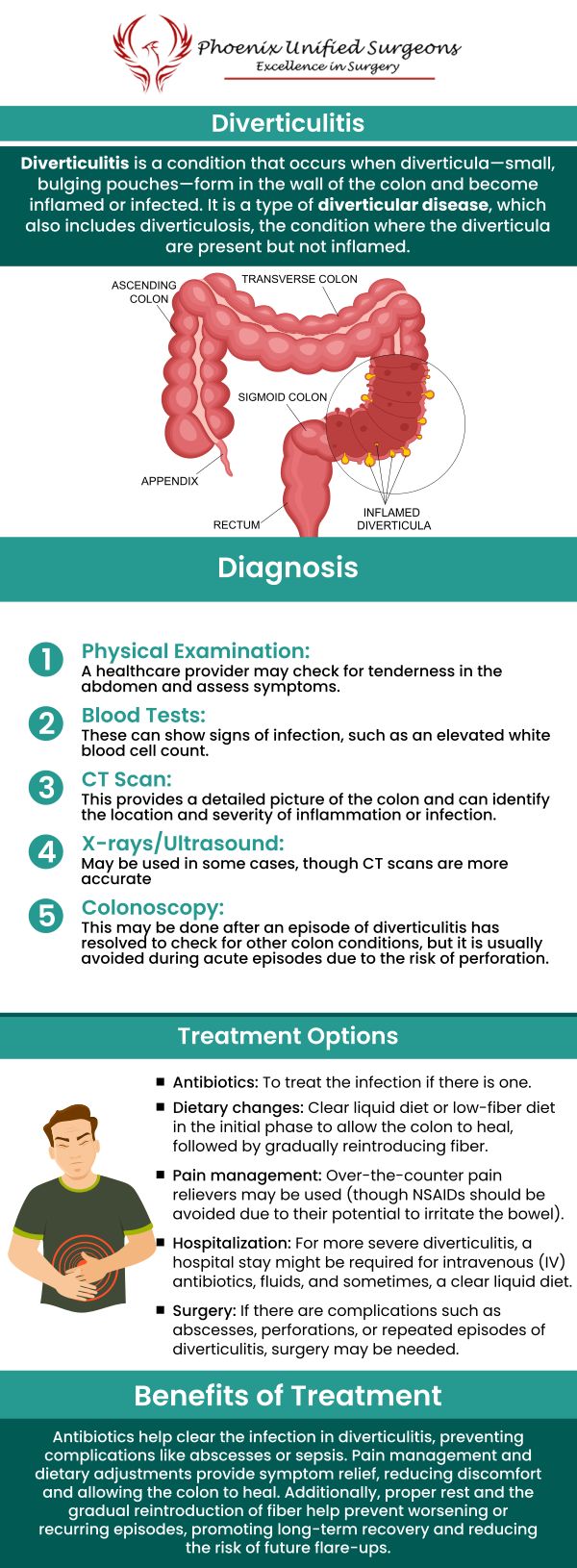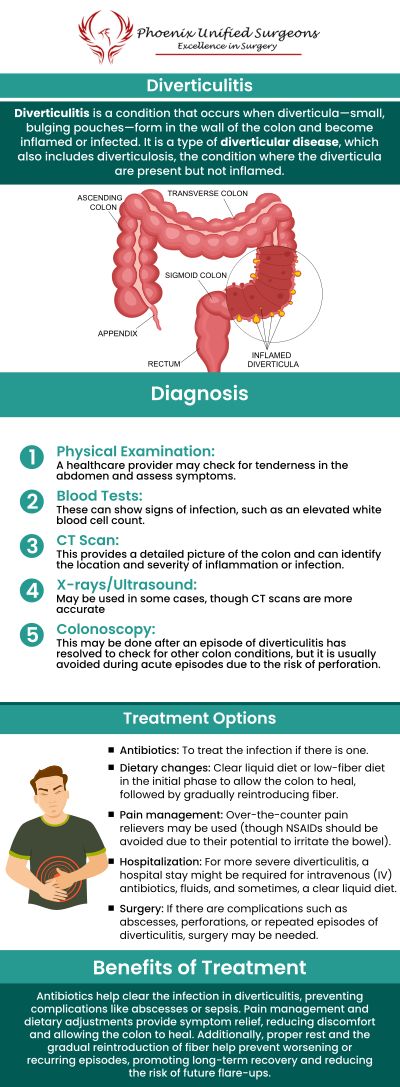What Does Diverticulitis Pain Feel Like?
Diverticulitis pain typically presents as sharp, cramp-like discomfort in the lower abdomen, often accompanied by bloating, fever, and changes in bowel habits. The pain can be mild to severe, and it may worsen with certain movements or pressure. At Phoenix Unified Surgeons, our team provides professional care and treatment options to manage diverticulitis, helping to alleviate pain and prevent complications. For more information, contact us or book your appointment online. Our office is conveniently located at 20333 N 19th Avenue, Ste 230 Phoenix, AZ 85027.


Table of Contents:
What is the difference between diverticulitis pain and other types of abdominal pain?
Is diverticulitis pain constant or does it come in waves?
How intense is the pain associated with diverticulitis, and where is it typically located?
What factors or activities can make diverticulitis pain worse?
Dr. Debora J. Fox-McClary: Expert in diverticulitis surgery
At Phoenix Unified Surgeons, our experienced team specializes in diagnosing and treating a wide range of abdominal conditions, including diverticulitis. Diverticulitis pain is a specific type of abdominal discomfort that occurs when small pouches (diverticula) in the wall of the colon become inflamed or infected. This pain most commonly presents as a steady, aching sensation in the lower left side of the abdomen. It often comes on suddenly, tends to be persistent, and may worsen over time. Diverticulitis can also cause symptoms such as fever, nausea, changes in bowel habits (like constipation or diarrhea), and tenderness when the area is pressed.
It’s important to recognize that abdominal pain can result from many different causes. For instance, pain from irritable bowel syndrome (IBS) is usually crampy and may improve after passing gas or having a bowel movement, while gallbladder issues typically cause pain in the upper right abdomen that can radiate to the back or shoulder. Appendicitis often starts as vague discomfort near the belly button before shifting to the lower right abdomen and intensifying.
The key feature that distinguishes diverticulitis pain is its steady, localized nature in the lower left abdomen, often accompanied by systemic symptoms such as fever. If you are experiencing persistent or severe abdominal pain, particularly if it is associated with fever, changes in bowel habits, or other concerning symptoms, timely medical evaluation is essential.
Diverticulitis pain most commonly presents as a constant, steady discomfort rather than coming in waves. Patients often describe the pain as a persistent ache, typically located in the lower left side of the abdomen. This discomfort may start as mild but can intensify over several hours or days. While the pain may fluctuate slightly, it is generally not cramping or intermittent like that seen with conditions such as irritable bowel syndrome or intestinal obstruction.
Along with persistent pain, diverticulitis may cause additional symptoms such as abdominal tenderness, fever, nausea, and changes in bowel habits. If you notice severe or ongoing abdominal pain—especially when accompanied by fever or gastrointestinal changes—it’s important to seek prompt medical evaluation.
Our experienced surgical team specializes in diagnosing and managing conditions like diverticulitis. We offer advanced, patient-centered care—ranging from non-surgical management to minimally invasive surgical options when necessary. If you are experiencing symptoms of diverticulitis, don’t wait. Our team is here to provide expert evaluation, personalized treatment plans, and compassionate support every step of the way.
At Phoenix Unified Surgeons, we frequently evaluate and manage patients with diverticulitis, a common condition that causes inflammation or infection of small pouches (diverticula) in the colon wall. Diverticulitis typically presents with moderate to severe abdominal pain, most often described as a constant, aching discomfort rather than intermittent cramping. This pain usually has a sudden onset, but in some cases, it may begin mildly and worsen over several days.
For most patients, the pain is localized to the lower left side of the abdomen, corresponding to the sigmoid colon—the most common site for diverticulitis. Rarely, particularly in patients of Asian descent, pain may be felt on the right side. The discomfort can intensify with movement or when the area is pressed, and is often accompanied by tenderness. Additional symptoms can include fever, nausea, and changes in bowel habits.
The hallmark of diverticulitis remains persistent, localized pain—most often on the lower left abdomen. If you experience sudden, severe pain, high fever, chills, or rectal bleeding, it is important to seek immediate medical attention. Our surgical team is experienced in diagnosing and treating diverticulitis, offering comprehensive care from initial evaluation to advanced surgical interventions if necessary. If you have concerns about abdominal pain or suspect diverticulitis, contact our office promptly for expert assessment and management.
At Phoenix Unified Surgeons, we know that managing diverticulitis involves more than medical treatment—it’s about understanding lifestyle factors that can worsen symptoms. Our team helps you identify and avoid triggers to achieve the best outcomes.
Several factors can exacerbate diverticulitis pain, mainly due to increased pressure in the colon. Diet plays a key role: low-fiber foods like processed grains, red meats, and fatty meals can contribute to constipation and straining, worsening symptoms. Physical inactivity can slow digestion, leading to constipation and discomfort. We encourage regular movement to support colon health.
Medications like NSAIDs, steroids, and opioids can irritate the digestive tract, so we guide patients toward safer alternatives. Smoking and excessive alcohol use are also linked to poorer colon health and can worsen symptoms.
Stress impacts gut function and can lead to increased pain. We recommend stress-management strategies as part of a comprehensive care plan. Lastly, listening to your body is crucial—ignoring the urge to have a bowel movement can lead to harder stools and more discomfort.
At Phoenix Unified Surgeons, we’re committed to helping you manage your diverticulitis through lifestyle changes and personalized care.
Dr. Debora J. Fox-McClary is a highly skilled colorectal surgeon with over 25 years of experience, specializing in the management of diverticulitis. Dual board-certified in both general surgery and colon and rectal surgery, Dr. Fox-McClary completed a prestigious fellowship in Colon and Rectal Surgery at the Mayo Clinic. Her expertise includes advanced, minimally invasive techniques, such as robotic-assisted procedures using the da Vinci Xi robot, which enable quicker recovery and less pain for patients.
Dr. Fox-McClary is also proficient in performing partial colectomy, a key surgical option for patients with recurrent or complicated diverticulitis. She is committed to a patient-centered approach, seeing surgery as a pivotal moment in a patient’s life and fostering a collaborative partnership. Her goal is to ensure patients are well-informed and actively involved in their treatment decisions, leading to a more positive surgical experience and improved long-term outcomes.
Our surgeons are here to guide you through every step of your diverticulitis management—whether that means expert medical advice, minimally invasive surgery, or ongoing lifestyle counseling. If you have concerns about diverticulitis pain, don’t hesitate to reach out to Phoenix Unified Surgeons for personalized care and support. For more information, contact us or book your appointment online. Our office is conveniently located at 20333 N 19th Avenue, Ste 230 Phoenix, AZ 85027. We serve patients from Phoenix AZ, Sun City AZ, Peoria AZ, Surprise AZ, Glendale AZ, Scottsdale AZ, and surrounding areas.
Check Out Our 5 Star Reviews



Additional Services You May Need
▸ Colon & Rectal Surgery
▸ Gallbladder Surgery
▸ Colonoscopy
▸ Wound Care
▸ Hernia Repair
▸ General Surgery
▸ Robotic and Minimally Invasive Surgery
▸ Appendectomy
▸ Colon Repair/Resection
▸ Lipoma & Cyst Removal
▸ Endoscopy and Colonoscopy
▸ Abdominal Pain
▸ Colon surgery for Diverticulitis
▸ Colon surgery for Colon Cancer
▸ Hemorrhoids
▸ Anal Fistulas
▸ Anal Pain Surgeries
▸ Colostomy Avoidance Surgery
▸ Fecal Incontinence Surgery
▸ Crohn’s Surgery
▸ Ulcerative Colitis Surgery






